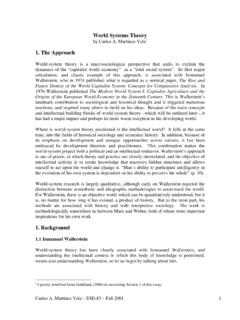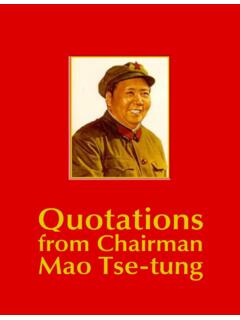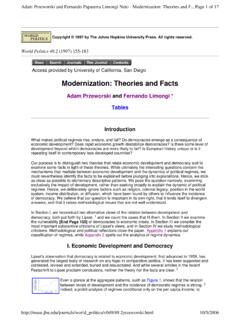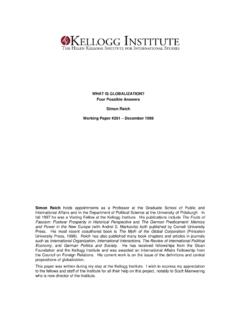Transcription of The Clash at 20 - Foreign Affairs
1 Clash at 20 AbridgedWhat did Samuel P. Huntington's "The Clash of Civilizations?" get right and wrong, and how does it look two decades later? THE Clash AT 20 The Clash at 20 i Gideon RoseIntroduction 1 Gideon RoseThe Clash of Civilizations?
2 3 Samuel P. HuntingtonThe Summoning 28 But They Said, We Will Not Hearken. Fouad AjamiThe Dangers of Decadence 37 What the Rest Can Teach the West Kishore MahbubaniThe Case for Optimism 42 The West Should Believe in Itself Robert L. Bartley Foreign Affairs Civilization Grafting 47 No Culture Is an Island Liu BinyanThe Modernizing Imperative 51 Tradition and Change Jeane J.
3 KirkpatrickDo Civilizations Hold? 55 Albert L. WeeksThe West Is Best 57 Gerard PielIf Not Civilizations, What? 58 Paradigms of the Post Cold War World Samuel P. HuntingtonConflict or Cooperation? 69 Three Visions Revisited Richard K. BettsThe Legacy of Sam Huntington 81 Eliot A.
4 Cohen, Francis Fukuyama, Gideon Rose, and Fareed ZakariaForeign Affairs Collection:The Clash at 20on the origins of the piece:In 1993, Foreign Affairs Editor Jim Hoge and Managing Editor Fareed Zarakaria were looking for something big and controversial to kick off their new redesign. They found their lead article in the work that Huntington was doing at the misinterpretations: Many thought that Huntington believed that civilizational Clash was inevitable. In fact, his article was a call to think about the ways in which cultural issues would come back into politics and geopolitics.
5 He actually wanted to avoid clashes where how it looks 20 years later:There are some things Huntington clearly got right. Cultural variables are very important, even in the modern world. Rather than diminishing them, modernization and development have allowed new opportunities for culture to policy prescriptions:One of his most important policy prescriptions was humility precisely because cultural differences and misunderstandings could lead to conflict, the United States shouldn t push Western culture onto other Gideon Rose Introduces the CollectionIn honor of its twentieth anniversary, we re revisiting Samuel P.
6 Huntington s The Clash of Civilizations? and the debate that followed. Read it and decide for yourself what things he got right and wrong. Click here to watch the video for more on these topics and all our other great ROSE is Editor of Foreign Affairs . July 31, 2013 1 IntroductionGideon RoseThe origins of The Clash of Civilizations? lie in the conjunc-tion of a special scholar and a special time. By the beginning of the 1990s, Samuel P. Huntington was already one of the most important social scientists of the second half of the twentieth century, having authored major works in every subfield of political science.
7 The hallmarks of his efforts were big questions, strong an-swers, independent thought, and clear expression. The end of the Cold War, meanwhile, had ushered in a new era of international relations along with a host of questions about what would drive it. Drawn, as always, to the major practical and theoretical questions of the day, Huntington set himself the task of limning this new more he thought about it, the more he decided that most ex-isting analyses were heading in the wrong direction. The future was not likely to be an easy run toward democracy, peace, and harmoni-ous convergence, nor was it likely to be a return to the old games of traditional great-power politics or ideological rivalry.
8 The great di-visions among humankind and the dominating source of conflict will be cultural, he concluded; the Clash of civilizations will dominate global politics. Huntington was an intellectual fox rather than a hedgehog. He had worked with many variables and theories over the years, and was open to the idea that any of them might dominate in particular cir-cumstances and that they might interact. In that context, he felt that cultural variables had been sold short, as recent scholarship often assumed that political actors were either homogenous, interchange-able players whose actions were driven by the structure of incentives they faced or distinctive players whose particularities would be sanded off by inexorable modernization .
9 Questions of identity were fundamental to human behavior, he believed, and were likely to be-come more rather than less relevant in years to come and civiliza-tions, being the broadest and deepest form of culture, would thus Gideon Rose2 Foreign affairsplay a crucial role in structuring future global interactions. He laid out his argument in a lecture at the American Enterprise Institute, turned that into an occasional paper for the Olin Institute of Strate-gic Studies at Harvard (of which he was director), and from there it evolved into the lead article in the Summer 1993 issue of Foreign Af-fairs at which point it went Clash article struck a nerve because it raised important and uncomfortable subjects in direct and powerful ways.
10 It seemed to speak some obvious truths about differences between human com-munities that mainstream discussion had ignored or silenced, rudely putting those differences front and center and demanding that they be addressed. In the subsequent hubbub, however, many of the nu-ances and subtleties of Huntington s argument got stripped away, as did some of his most important points namely, that civilizational clashes were a risk rather than a certainty and that they could and should be minimized by the adoption of an appropriately humble and sensitive American Foreign the 1990s, the article was often attacked.







